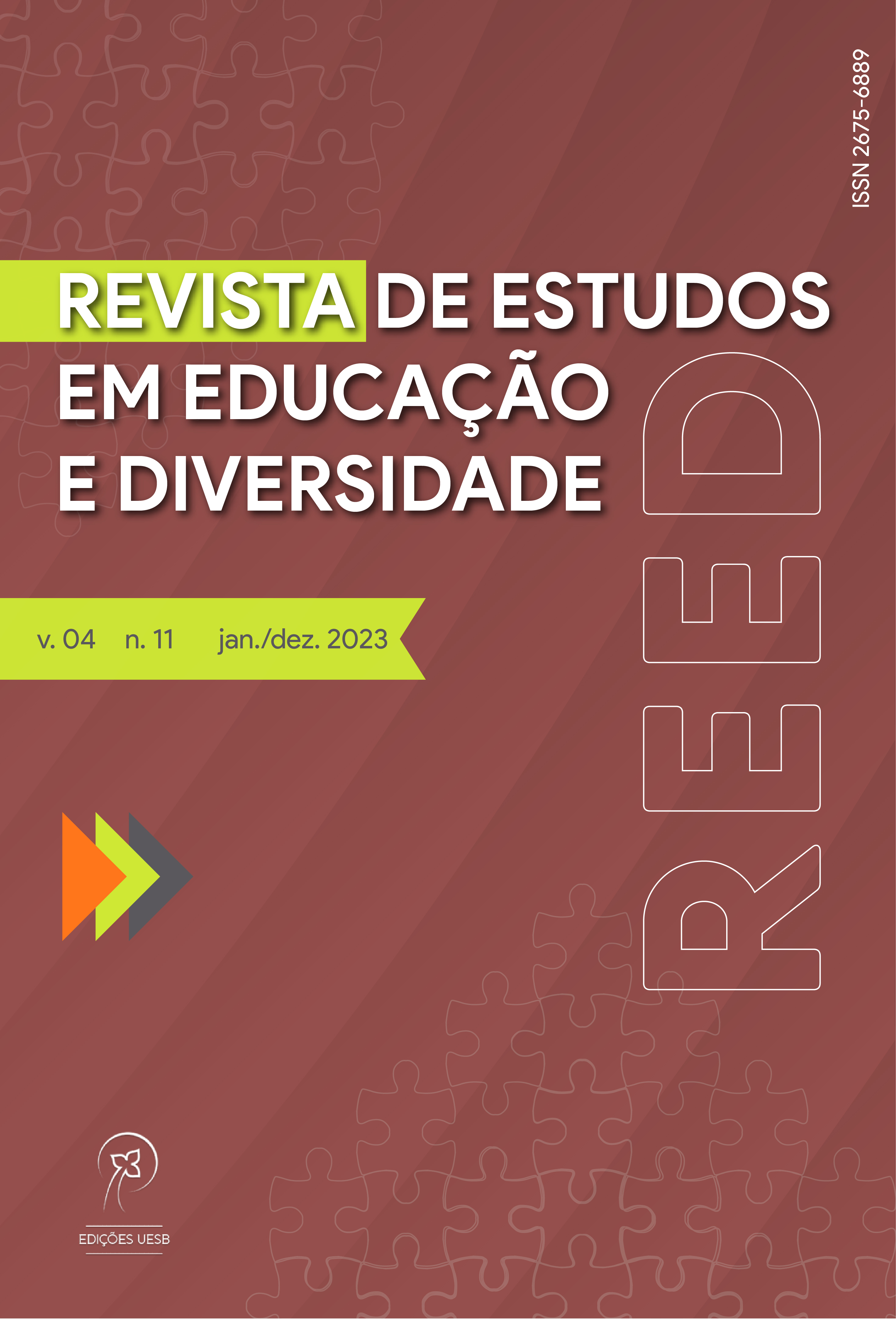A abordagem didática na Educação de Jovens, Adultos e Idosos: suas faces e interfaces no processo
DOI:
https://doi.org/10.22481/reed.v4i11.11594Palavras-chave:
Didática, Educação de Jovens, Adultos e Idosos, Práticas EducativasResumo
O presente artigo tem como objetivo investigar como ocorrem os processos didáticos/educativos, a partir das percepções do professor e dos discentes de uma escola pública do interior da Bahia. Desse modo, constitui-se como um estudo de campo, de caráter qualitativo, tendo como instrumento de produção de dados as entrevistas semiestruturadas. A pesquisa foi realizada com professores e estudantes da Educação de Jovens, Adultos e Idosos (EJAI), de um colégio que atende a modalidade em pauta, localizado no interior da Bahia. Para o desenvolvimento desta pesquisa, utilizou-se como aporte teórico autores como: Libâneo (2002; 2013), pela discussão sobre as ações didático-pedagógicas e Freire (2000; 2011) por toda a contribuição para a Educação de Jovens, Adultos e Idosos, dentre outros. Os dados possibilitaram uma melhor reflexão sobre as práticas didáticas desenvolvidas pelos professores da EJAI, pois foi possível identificar que estão revestidas de técnicas, métodos e conteúdo de ensino que alcançam os estudantes, contribuindo para a qualificação do seu processo formativo. O trabalho docente realizado no colégio pesquisado é de grande relevância, atende os interesses dos educandos e possibilita o protagonismo destes no processo pedagógico.
Downloads
Referências
ANDRADE, Maria Eurácia Barreto de; ESTRELA, Sineide Cerqueira. A formação docente e os desafios para a EJA. In: ANDRADE, Maria Eurácia Barreto de; ESTRELA, Sineide Cerqueira (orgs.). Saberes e partilhas na educação de jovens, adultos e idosos. Cruz das Almas: EDUFRB, 2021, p. 77-103. E-book. Disponível em: https://online.fliphtml5.com/sjtcu/zwuo/#p=1. Acesso em: 13 jul. 2022.
BÖES, João Carlos; MATOS, Diego de Vargas; GUERRA, Avaetê de Lunetta e Rodrigues. Desafios enfrentados pelos docentes da educação de jovens e adultos na atualidade. Revista Educação em Páginas, Vitória da Conquista, v. 2, p. e13434, 2023. Disponível em: https://periodicos2.uesb.br/index.php/redupa/article/view/13434. Acesso em: 6 out. 2023.
BRANDÃO, Carlos Rodrigues. Reflexões sobre como fazer trabalho de campo. Sociedade e cultura, v. 10, n. 1, p. 11-27, 2007. Disponível em: https://revistas.ufg.br/fcs/article/view/1719. Acesso em: 13 jul. 2022.
CHIZZOTTI, Antonio. A pesquisa qualitativa em ciências humanas e sociais: evolução e desafios. Revista Portuguesa de Educação, v. 16, n. 2, p. 221-236, 2003. Disponível em: https://www.redalyc.org/pdf/374/37416210.pdf. Acesso em: 13 jul. 2022.
FREIRE, Paulo. Alfabetização de Jovens e Adultos. In: FREIRE, Paulo. Educação na Cidade. São Paulo: Cortez editora, 2000. p. 67-70.
FREIRE, Paulo. Pedagogia da autonomia: saberes necessários à prática educativa. São Paulo: Editora Paz e terra, 2011.
LIBÂNEO, José Carlos. Didática. 2. ed. São Paulo: Cortez, 2013.
LIBÂNEO, José Carlos. Didática: velhos e novos temas. 2002.
OLIVEIRA, Gilvaneide Ferreira. Educar numa Perspectiva Complexa e Transdisciplinar em Paulo Freire. In: OLIVEIRA, Maria Marly; RIBEIRO, Magali Maria de Lima. Paulo Freire: 20 Anos da Ausência Presença. Recife: Tarcísio Pereira Editor, 2020. p. 48-59.
PAIVA, Jane; FERNANDES, Fátima Lobato. Da concepção à prática de formação inicial: A EJA no currículo de pedagogia. Revista Teias, v. 17, p. 25-42, Edição Especial. 2016. Disponível em: https://www.e-publicacoes.uerj.br/index.php/revistateias/article/view/25007/18074. Acesso em: 13 jul. 2022.
SANTOS, José Jackson Reis dos. Especificidades dos saberes para a docência na educação de pessoas jovens e adultas. Práxis Educacional, Vitória da Conquista, v. 6, n. 8, p. 157-176, 2010. Disponível em: https://periodicos2.uesb.br/index.php/praxis/article/view/623. Acesso em: 9 jan. 2022.
Downloads
Publicado
Como Citar
Edição
Seção
Licença
Copyright (c) 2022 Revista de Estudos em Educação e Diversidade - REED

Este trabalho está licenciado sob uma licença Creative Commons Attribution 4.0 International License.
Você é livre para:
Compartilhar - copia e redistribui o material em qualquer meio ou formato; Adapte - remixe, transforme e construa a partir do material para qualquer propósito, mesmo comercialmente. Esta licença é aceitável para Obras Culturais Livres. O licenciante não pode revogar essas liberdades, desde que você siga os termos da licença.
Sob os seguintes termos:
Atribuição - você deve dar o crédito apropriado, fornecer um link para a licença e indicar se alguma alteração foi feita. Você pode fazer isso de qualquer maneira razoável, mas não de uma forma que sugira que você ou seu uso seja aprovado pelo licenciante.
Não há restrições adicionais - Você não pode aplicar termos legais ou medidas tecnológicas que restrinjam legalmente outros para fazer qualquer uso permitido pela licença.






